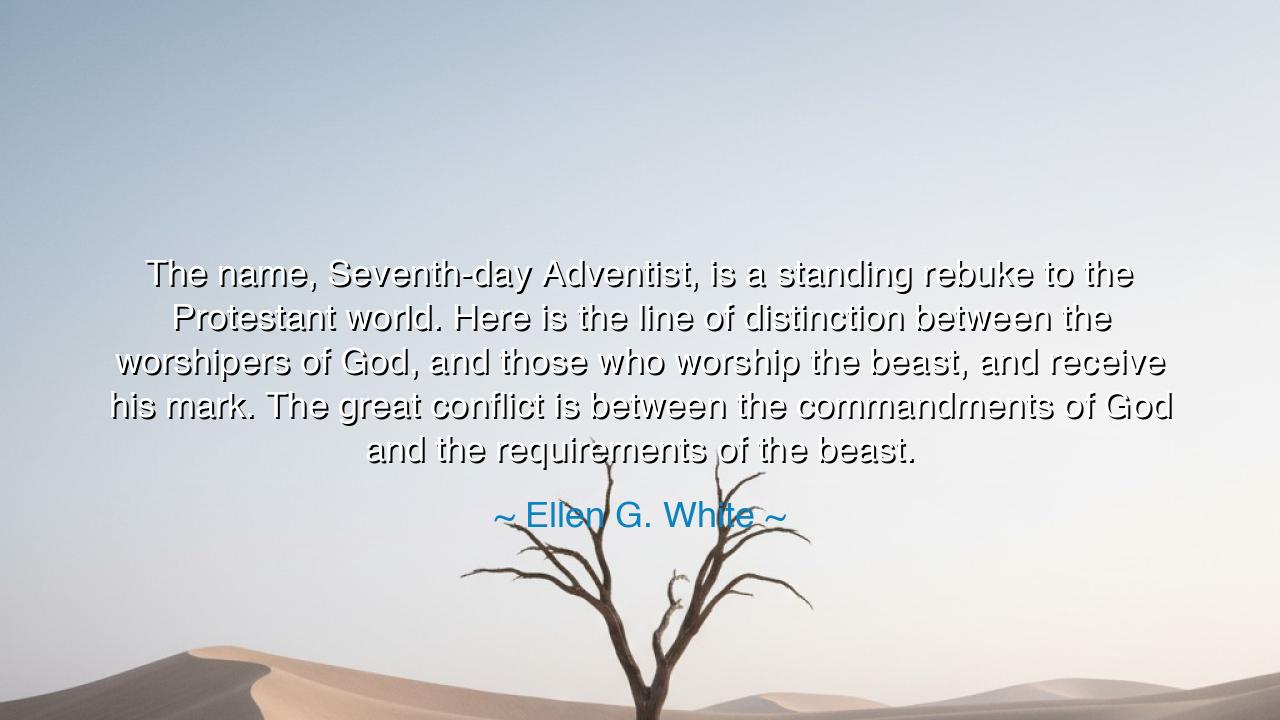
The name, Seventh-day Adventist, is a standing rebuke to the
The name, Seventh-day Adventist, is a standing rebuke to the Protestant world. Here is the line of distinction between the worshipers of God, and those who worship the beast, and receive his mark. The great conflict is between the commandments of God and the requirements of the beast.






“The name, Seventh-day Adventist, is a standing rebuke to the Protestant world. Here is the line of distinction between the worshipers of God, and those who worship the beast, and receive his mark. The great conflict is between the commandments of God and the requirements of the beast.” — Ellen G. White
In these thunderous and prophetic words, Ellen G. White, one of the founders and spiritual voices of the Seventh-day Adventist Church, speaks with the authority of one who has glimpsed both the majesty of divine truth and the danger of human compromise. Her words were not meant to flatter nor to soothe—they were a call to awakening, a declaration of spiritual identity in an age of confusion. When she says the “name, Seventh-day Adventist, is a standing rebuke to the Protestant world,” she is not uttering pride, but conviction. For in that name lies both a faith and a testimony—one that holds fast to the commandments of God and the faith of Jesus in the face of worldly pressures and religious complacency.
The origin of these words reaches back to the mid-nineteenth century, a time of spiritual upheaval and rebirth in America. After the Great Disappointment of 1844, when those who awaited Christ’s return found themselves bewildered and heartbroken, a remnant of believers gathered around new light: the revelation of the Seventh-day Sabbath and the continuing ministry of Christ in the heavenly sanctuary. It was in this crucible of sorrow and study that the name “Seventh-day Adventist” was born—a name that declared both obedience and hope. “Seventh-day” proclaimed allegiance to God’s fourth commandment, honoring the Sabbath He Himself sanctified. “Adventist” bore witness to the promise of His soon coming, the blessed hope of the faithful. To Ellen White, this name was no mere label; it was a banner in the great war between truth and deception, light and darkness.
When she speaks of “the beast” and “his mark,” she draws upon the apocalyptic visions of the Book of Revelation, where two forces contend for the soul of humanity—the Creator, who commands in righteousness, and the powers of the world, who seek to substitute man’s traditions for God’s law. To her, this was not a metaphor, but a living reality: a spiritual battle waged in hearts, nations, and churches. The “requirements of the beast” represented compromise—religion divorced from obedience, worship shaped by convenience rather than conviction. Against this tide, she saw the Adventist faith as a fortress of fidelity—a people set apart, not by arrogance, but by their refusal to trade divine truth for human approval.
History offers many mirrors to this struggle. Consider the early reformers—Martin Luther, John Wycliffe, and others—who defied the corrupt powers of their age to return the Word of God to the people. Their courage carved the path of Protestantism, yet Ellen White warned that even their descendants had begun to grow complacent, substituting creed for conviction, tradition for transformation. To her, the Adventist message was the next step in that divine reformation: a restoration of obedience to all ten commandments, including the Sabbath, which had been trampled under centuries of neglect. Thus, she declared that the very name of this people was a rebuke—not of individuals, but of systems that exalted human authority above divine command.
Yet, within her words burns not condemnation but appeal. For Ellen White’s message was never one of exclusion, but of invitation—a summons to all who love truth to stand on the side of God’s law and Christ’s mercy. The “great conflict” she describes is not fought with weapons, but with faithfulness. It is a battle waged in the conscience, where every soul must choose between the comfort of conformity and the courage of conviction. To obey God’s commandments, even when the world mocks or misunderstands, is the mark of spiritual nobility.
The wisdom here, therefore, is timeless: true faith is never neutral. To serve God fully is to draw a line, to stand where others waver, and to let one’s life itself be a rebuke to falsehood. The name “Seventh-day Adventist” becomes, in Ellen White’s vision, a living symbol of loyalty—of those who keep the commandments not out of fear, but out of love. To live by such faith is to join a lineage of believers who have always stood apart: Noah in a world of disbelief, Daniel in Babylon, the disciples in Rome. Each, in their way, carried a name and a message that shone against the darkness of their time.
So, to those who hear these words across the ages, let them stir you to reflection: What name do you bear? What truth does your life proclaim? Ellen White reminds us that to follow God wholly is to walk a narrow path—one marked by obedience, humility, and courage. Let your convictions be clear, your worship sincere, your heart steadfast. For the “great conflict” still rages—not on battlefields, but in the hearts of men and women deciding each day whom they will serve.
And when history’s final chapter is written, may it be said of you, as of all who stood firm in ages past, that you were among those who kept the commandments of God, who honored His truth above all else, and who, in word and deed, bore a name that glorified the Creator and pointed others toward the light eternal.






AAdministratorAdministrator
Welcome, honored guests. Please leave a comment, we will respond soon